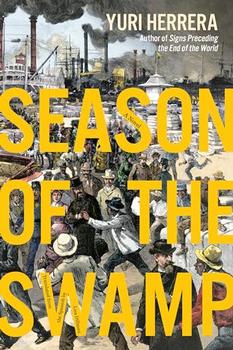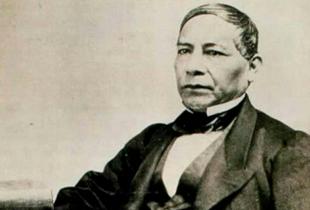Summary | Excerpt | Reviews | Beyond the Book | Read-Alikes | Genres & Themes | Author Bio

A Novel
by Yuri HerreraThis article relates to Season of the Swamp
 In his novel Season of the Swamp, Yuri Herrera illuminates the year and a half Benito Juárez spent as a political exile in New Orleans, an often-overlooked period in the life of Mexico's first Indigenous president.
In his novel Season of the Swamp, Yuri Herrera illuminates the year and a half Benito Juárez spent as a political exile in New Orleans, an often-overlooked period in the life of Mexico's first Indigenous president.
Juárez was born in 1806 to a Zapotec family living in the town of San Pablo Guelatao, Oaxaca, Mexico. He was orphaned at a young age, after which he was raised by his uncle and attended a local seminary school. Later, he earned a law degree from the Institute of Arts and Sciences of Oaxaca, the first student from that school to do so. He entered politics by running for and winning a position on his municipal council as a member of the Liberal Party, which aimed to expand civil rights and religious freedom in Mexico. This put them in opposition to the Catholic Church and the established aristocracy, who wanted to maintain their control over Mexico. Juárez went on to hold a number of political offices, serving as representative on the state and federal legislatures, as a judge, and as governor of Oaxaca.
In the 1853 election, the Conservative Party gained power, leading to the formation of a dictatorship under Antonio López de Santa Anna. Juárez was exiled along with many other members of the Liberal Party and spent the next eighteen months living in New Orleans (the period of his life depicted in Season of the Swamp). At the end of that period, Santa Anna was overthrown, and Juárez became minister of justice and public instruction. In that position, he played a major role in the administration's reforms. One of these was the Ley Juárez ("Juárez Law"), which did away with special courts for the clergy and military in order to establish a more equitable judicial system. He was also involved in drafting the 1857 constitution, which expanded civil and voting rights, abolished hereditary nobility, and established religious freedom.
In 1857, he became head of the Supreme Court, which made him next in the line of succession to be president. This position became crucial the next year, when conservatives led a coup against the liberal government and ousted the sitting president, starting the Reform War, which pitted a conversative government based in Mexico City against the liberal government, now led by Juárez from Veracruz. Fighting lasted for two years, but under Juárez's leadership the liberals eventually won. The election of 1861 confirmed his position as President.
The next year, Mexico faced a new external threat. Napoleon III sought to conquer Mexico and rule by installing a puppet emperor, Maximilian of Austria. French forces drove Juárez and his government out of the capital. They continued to lose ground, but never gave up resisting the occupation. In 1865, the end of the American Civil War allowed the United States to turn its attention to international affairs. They strongly opposed European presence in the Americas, and put political pressure on France to remove their troops from Mexico. Between this and the continued Mexican resistance to Maximilian's rule, Napoleon decided to withdraw in 1867. Without the support of the French military, Maximilian was unable to maintain control of the country, and Juárez was able to reestablish the constitutional government.
Benito Juárez remained President of Mexico until his death from heart attack in 1872, though he lost a great deal of popularity due to amendments he proposed to the constitution, which were seen as an attempt to increase his own power. Despite this controversy, his legacy is of a man who worked tirelessly to defend his country and establish liberty for its people.
Filed under People, Eras & Events
![]() This article relates to Season of the Swamp.
It first ran in the October 2, 2024
issue of BookBrowse Recommends.
This article relates to Season of the Swamp.
It first ran in the October 2, 2024
issue of BookBrowse Recommends.
Your guide toexceptional books
BookBrowse seeks out and recommends the best in contemporary fiction and nonfiction—books that not only engage and entertain but also deepen our understanding of ourselves and the world around us.